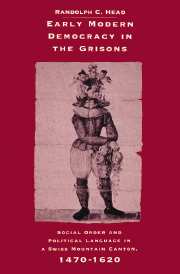 Early Modern Democracy in the Grisons
Early Modern Democracy in the Grisons Book contents
- Frontmatter
- Contents
- List of illustrations
- List of tables
- Acknowledgments
- Note on languages, orthography, and translations
- Abbreviations
- INTRODUCTION: Social order, politics, and political language in Graubünden, 1470–1620
- 1 Communalism and other political models in Europe and in Graubünden
- 2 Graubünden to 1520: geography, society, history
- 3 Local practice and federal government in the Freestate
- 4 From consolidation to communal politics: the Freestate, ca. 1530–1580
- 5 Elite power and popular constraint in sixteenth-century Rhaetia
- 6 Reform, communal action and crisis, ca. 1580–1639
- 7 Political language and political cosmology during the crisis years
- CONCLUSION: Democracy in early modern Graubünden
- Bibliography
- Index
- CAMBRIDGE STUDIES IN EARLY MODERN HISTORY
CONCLUSION: Democracy in early modern Graubünden
Published online by Cambridge University Press: 14 October 2009
- Frontmatter
- Contents
- List of illustrations
- List of tables
- Acknowledgments
- Note on languages, orthography, and translations
- Abbreviations
- INTRODUCTION: Social order, politics, and political language in Graubünden, 1470–1620
- 1 Communalism and other political models in Europe and in Graubünden
- 2 Graubünden to 1520: geography, society, history
- 3 Local practice and federal government in the Freestate
- 4 From consolidation to communal politics: the Freestate, ca. 1530–1580
- 5 Elite power and popular constraint in sixteenth-century Rhaetia
- 6 Reform, communal action and crisis, ca. 1580–1639
- 7 Political language and political cosmology during the crisis years
- CONCLUSION: Democracy in early modern Graubünden
- Bibliography
- Index
- CAMBRIDGE STUDIES IN EARLY MODERN HISTORY
Summary
This study set out to investigate the political debate that took place in the Rhaetian Freestate in the early seventeenth century, and to determine the foundations and contours of the system that was at stake. During the political crisis of 1607–20, a few Rhaetian authors found it plausible and expedient to call their form of government “democratic”, and to ascribe all political authority to “the common man” in the Freestate of the Three Leagues. My argument has been that the unusual social order, institutional organization, and political practice that Rhaetian citizens experienced in their communes provided a substrate for such statements, a political culture that included widely accepted assumptions and beliefs about the Freestate's past and about the nature of legitimate authority within it. When foreign pressure and social tension both increased after 1600, such unreflected ideas became the common ground from which most contemporary polemicists argued, even if they occasionally borrowed vocabulary and concepts from other sources.
I also maintain that while the origins of Rhaetian political culture must be sought in the social practice of local communities, its subsequent elaboration depended on the political and institutional development of the Freestate as a whole. The rural commune, with its specific combination of autonomous family labor and collective economic and social discipline, effectively incubated certain ideas about the sources of legitimate authority, and about specific methods for reaching decisions and distributing common resources and burdens.
- Type
- Chapter
- Information
- Early Modern Democracy in the GrisonsSocial Order and Political Language in a Swiss Mountain Canton, 1470–1620, pp. 246 - 252Publisher: Cambridge University PressPrint publication year: 1995


